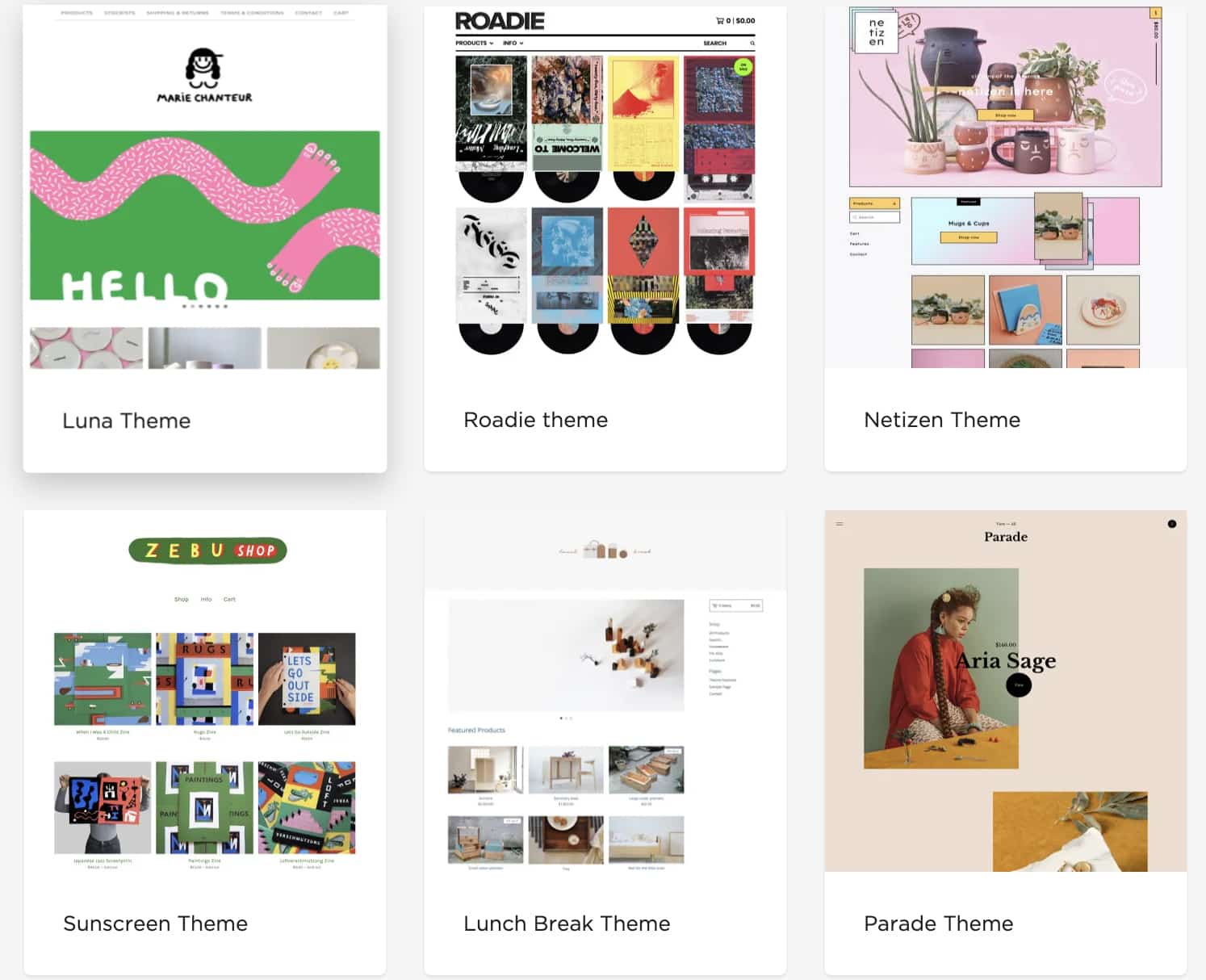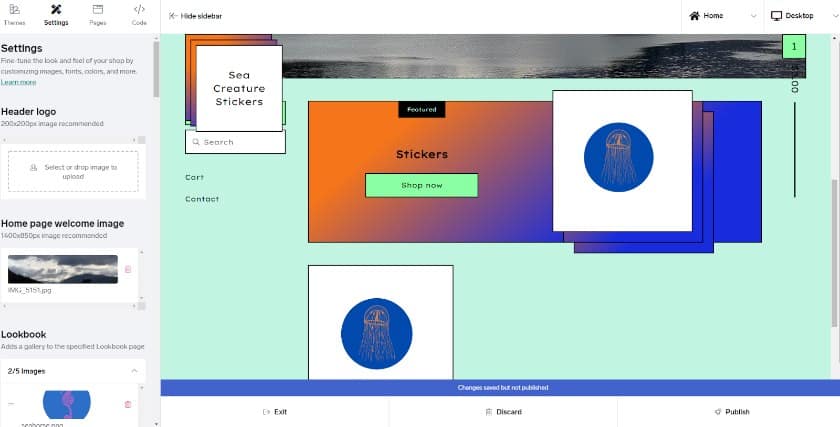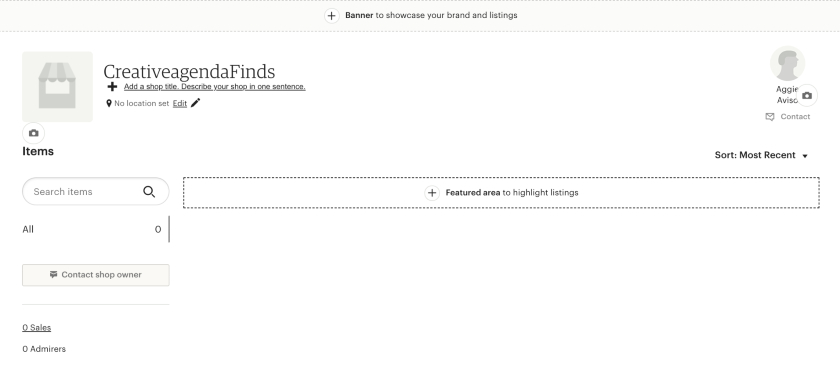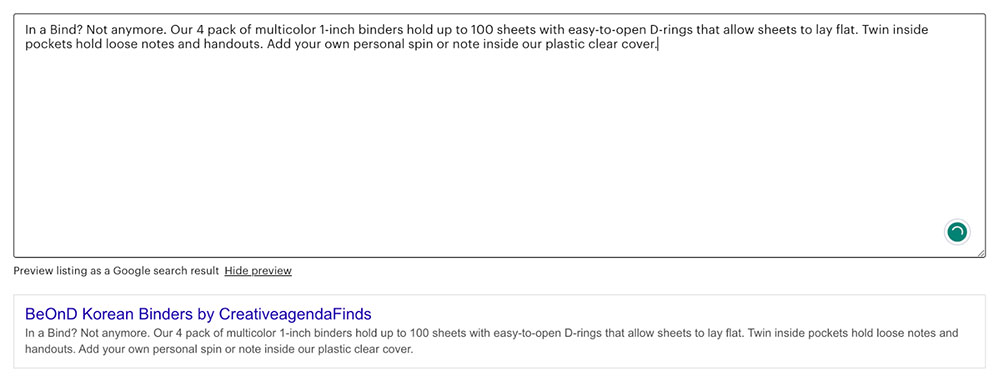Creative artists and entrepreneurs usually choose between Big Cartel vs Etsy as platforms to sell their products online. They both have free plans and provide easy-to-use tools to get started on selling.
Big Cartel gives you a full standalone store with the option to use a custom domain. It also lets you save on fees, which Etsy has a lot of. Etsy, meanwhile, gives you an advantage in marketing and product exposure through its marketplace audience and search engine tools, which Big Cartel doesn’t provide.
Comparing Etsy vs Big Cartel boils down to:
- Big Cartel: Best for artists with a solid market audience and offering limited product runs
- Etsy: Best for creative vendors selling handmade and vintage products
To evaluate the two, I looked at price, website tools, marketing features, and ease of use. I also tested both platforms by building the same demo store on each.
Etsy vs Big Cartel: Quick Comparison
If you are looking for more ecommerce alternatives or are unsure if Big Cartel and Etsy are right for you, see how they compare with other top ecommerce platforms, best free ecommerce website builders, and Etsy alternatives.
Big Cartel vs Etsy: Pricing & Payments
Subscription Monthly Plans | $15–$30/month | $10/month |
Free Plan | Yes | Yes |
Transaction Fees | None | 6.5% from each sale (item price + shipping fee) |
Listing Fees | None | 20 cents per listing |
Payment Processing Fees | 2.9% + 30 cents | 3% plus 25 cents each sale (US); varies per country |
Point-of-Sale (POS) system (for in-store or offline sales) | Yes (Stripe) | Yes (Square integration) |
Built-in Payment Provider (Optional) | N/A | Etsy Payments |
Option to Connect to Third-party Processor | Yes | No |
Our Quick Take: When it comes to pricing, going with Big Cartel is the better option. While both platforms have forever-free plans, Etsy has numerous fees that can cut into your bottom line in the long run.
Big Cartel Pricing Plans
Big Cartel has a forever-free plan (Gold) and two paid tiers, Platinum ($15/month) and Diamond ($30/month).
- Gold ($0): Big Cartel allows you to sell up to five products with one photo per item. It also lets you connect a custom domain, such as www.yourstore.com. If you don’t own a custom domain, you can use a Big Cartel subdomain, like yourstore.BigCartel.com, for free. You can set up product options and variants and even run discounts and promotions.
- Platinum ($15/month): Under this plan, you get to sell up to 50 products with five photos per item. Theme editing via CSS, inventory tracking, and integration with Google Analytics are unlocked, too.
- Diamond ($30/month): Aside from the additional features added in Platinum, Diamond lets you sell up to 500 products with five products per item.
I recommend going with Gold if you want to sell products and keep overhead costs low—you get your own branded online store, can even use your own domain, and start accepting payments, all for free.
Etsy Pricing Plans
Etsy allows you to sell in its marketplace for free, but technically, you still need to pay a minimal fee for product listings.
For example, each product listing costs 20 cents and is valid for four months in case it doesn’t sell out. Once it expires, the product is taken down unless you renew, which is a new 20-cent charge. For listings that get sold and have quantities of more than one, it automatically renews once an item is sold—so you are charged 20 cents per item. You also have transaction and payment processing charges for each sale.
All things considered, Etsy also has minimal upfront costs. You can upgrade to its Plus plan for $10 monthly for additional features such as more customizable options and email alerts.
Payment Processing & Fees
Both platforms have limited payment providers. Big Cartel lets you connect Stripe and PayPal, and nothing else. Etsy, meanwhile, requires its sellers to exclusively use Etsy Payments, its built-in payment provider. Etsy Payments then lets you accept credit card payments, PayPal, Apple Pay, and Google Pay in your Etsy Store.
When it comes to transaction fees, Big Cartel doesn’t charge any transaction fee for each sale. You just need to pay the standard processing fees (2.9% + 30 cents) from Stripe and PayPal.
Etsy, on the other hand, charges a 6.5% transaction fee for the total sold item price for every sale you make on your Etsy Store. Moreover, Etsy Payments charges a slightly higher processing fee than the standard average—3% plus 25 cents—and this varies based on the country you are located in. To learn Etsy’s fees in-depth, refer to our Etsy Seller Fees guide.
Big Cartel vs Etsy: Site Builder & Maintenance
Website Templates | 18 | None |
Editing Tool | WYSIWYG editor | None |
Customization | Yes (CSS and HTML) | None |
SEO & Blogging | Weak | Average |
App Marketplace/ Add-ons | Limited | Limited |
SSL Certificates | Free | Free |
PCI-Compliant | No | Yes |
Our Quick Take: Big Cartel is your best bet if you want a full standalone online store. Its free plan lets you design your own store and even connect it to a custom domain. On the other hand, you only get to own a sub-shop within Etsy and are confined to a single page.
If you want to know how we tested and built our demo stores, you can follow along the guides below:
NOTE: Etsy has its ecommerce platform, Pattern by Etsy, where you can build a website to sell your products. It costs $15 per month and comes with a 30-day free trial. Pattern by Etsy is (strangely enough) not integrated with the Etsy marketplace, so you will be responsible for generating your traffic. I did not consider this platform during my evaluation of the two platforms because sellers considering Etsy are likely doing so because of its marketplace. Visit Pattern by Etsy to learn more.
Website Builder & Themes
The biggest difference between Etsy and Big Cartel is the ability to create a standalone store with Big Cartel—meaning you get your own website and even use a custom domain (website address).
Big Cartel was created with artists in mind, so it comes as no surprise that its templates are beautifully designed—elegant and modern layouts that make product photos shine.

Big Cartel’s templates, although few, are diverse and feature aesthetically pleasing layouts.
Big Cartel’s website builder is an easy-to-use WYSIWYG editor. You can only change banner images, font types, color, and sizes, and add or disable certain sections, but when I was building a demo store, I didn’t find this as a disadvantage because Big Cartel’s template was beautiful to begin with. However, I see that this can be very frustrating for businesses wanting to make their stores their own.

Big Cartel’s WYSIWYG editor provides limited customization.
Etsy lets you have a page where you can sell your products, and other than customizing your header banner, adding information about your store, and uploading a profile picture, there is not much else you can do when customizing your store.

With Etsy, you can add a banner or a header picture to the top of your shop, describe your shop in a sentence, add a featured area to highlight product listings, and specify contact details.
SEO Tools & Blogging
Etsy and Big Cartel don’t have blogging features. SEO, on the other hand, is one of Big Cartel’s weaknesses. It doesn’t have SEO tools you can set up—not even meta descriptions for your product page. While Etsy didn’t have an SEO section when I set up a product page during my demo store building, I noticed that I can preview a product description as a Google search result, so I could adjust accordingly.

With Etsy, you can see a preview of how your product listing looks on a Google search result.
Site Security & Compliance
Both platforms are shared hosting solutions, so you do not have to worry about site security as they come with free SSL certificates. Etsy also takes care of Payment Card Industry (PCI) compliance as a marketplace for all Etsy sellers.
It is worth noting that Big Cartel’s Merchant User Agreement states that it is not PCI-compliant. This isn’t really a problem, as you can still depend on your chosen payment provider’s security and compliance (and Stripe and PayPal are two of the most popular and secure platforms). But most shared hosting ecommerce providers, like Shopify, are PCI-compliant.
App Integrations & Add-ons
Both platforms offer a fairly limited number of integrations but cover essential functions you might need to add to your store, such as marketing, store management, shipping, and fulfillment.
Etsy has better integrations for finance, social media marketing, store management, and SEO.
Big Cartel vs Etsy: Sales & Product Features
Product Features | Advanced | Basic |
Mobile App | Yes; Big Cartel on mobile | Yes; Sell on Etsy App |
Audience Traffic (existing) | N/A | Yes, 90.5M active buyers |
Marketing/Promotion Tools | N/A | Etsy Ads, Offsite Ads |
Our Quick Take: Etsy wins over Big Cartel when it comes to product and sales features. It offers more product management options, better marketing features, and, more importantly, provides you with an existing audience of 90.5 million active buyers as of this writing.
Product Management
You can provide more detailed product listings on Etsy than in Big Cartel. For example, Etsy lets you upload up to 10 photos plus a video (up to 15 seconds and under 10MB); Big Cartel only lets you upload up to five photos on paid plans but no video.
You can set up product variations for both platforms, but Etsy has custom work order tools (or personalization order features) built-in; Big Cartel doesn’t have one. Etsy also lets you digital downloads while Big Cartel needs a paid third-party app to activate the feature.
More importantly, Etsy allows for unlimited product listings—Big Cartel only lets you sell up to 500 products, even on its highest plan (Platinum at $19/99/month).
The only downside you get with Etsy when it comes to product management is you are restricted to selling handmade, customized, and vintage products—something that isn’t an issue with Big Cartel.
Inventory Features
Big Cartel also doesn’t have the feature under its free plan but unlocks it with its paid options. With Big Cartel, items are automatically marked sold out when inventory runs out, and from the admin dashboard, zero inventory products turn red, and those that have 25% and under inventory levels turn yellow.
Etsy, on the other hand, lets you set inventory quantities on its products and unless disabled, automatically renews your product listing until the item sells out.
If you need help with inventory tracking, consider our following resources and recommendations:
Marketing Tools
This is one area where Etsy beats Big Cartel by a mile. For one thing, Big Cartel only lets you create discounts and promotions, and not much else. It doesn’t have built-in email marketing tools or an abandoned cart saver feature, although Mailchimp is an available email marketing integration.
With Etsy, you can create discounts and coupons, run Etsy and Offside Ads (for promotion within the Etsy search engine and Google ads), and offer discounted postage labels. More importantly, if you are a new seller, Etsy makes it easy by exposing your store to its existing audience of 90.5 million active buyers.
Note, though, that Etsy also has over 5.2 million active sellers (as of Etsy’s 2020 Global Census). Ensuring that your products stand out from the competition is the challenge. Read our tips for selling on Etsy to stand out from the competition.
Big Cartel vs Etsy: Ease of Use
Onboarding and Setup | Yes; easy-to-follow setup wizard | Yes; easy-to-follow setup wizard |
Store Management | Beginner-friendly | Beginner-friendly |
Online Knowledgebase | Extensive | Extensive |
Community Forum | None | Yes; active and helpful members |
Customer Support: Live Chat, Email, and Phone | Email support, Monday–Friday, 8 a.m.–6 p.m. Eastern time | Email, phone support by schedule |
Our Quick Take: It’s a tie between Big Cartel and Etsy when it comes to ease of use. Both platforms are intuitive and very easy to use. Although both have limited support, they have extensive help centers and knowledge bases you can refer to for troubleshooting issues.
Onboarding & Setup
If you only have a few products to sell, you can finish setting up stores on both platforms in just a couple of hours.
Etsy’s setup does not require as much time and effort since you do not have to set up a whole website. When I was building a demo store, I spent more time creating product listings because of the comprehensive information you can include than styling my store.
With Big Cartel, since I signed up for its free plan and was limited to five products, I was able to finish everything quickly. Its site builder provides more customization than Etsy’s but is still quite limited in terms of design flexibility. Overall, I was still satisfied with how my demo store looked.
Customer Support
Big Cartel doesn’t offer live chat or phone support. It provides email support at specific times of the day, and I find their email support very helpful and competent. Email response time is fast, and its support team is pretty active in the provider’s social media accounts, especially Twitter.
Etsy also doesn’t offer live chat or phone support. However, you can schedule a phone call with Etsy’s support staff or send an email if you have any concerns. The turnaround time is usually within 24 hours.
Big Cartel vs Etsy: Expert Score
Our Quick Take: Big Cartel and Etsy are both great platforms for creative artists and entrepreneurs wanting to sell online. It will boil down to which are your business priorities. If you are starting out and need help getting your product in front of an audience easily, go with Etsy. If you are already established and have a solid audience, you will be saving a lot in fees if you go with Big Cartel.
Big Cartel Expert Review
Big Cartel’s biggest strengths over Etsy are its product type inclusions (not exclusive to handmade items), beautifully designed templates, zero transaction fees, and free plan inclusions. I cannot rave enough about how its free plan is such a steal—no wonder it made our list of recommended best free ecommerce platforms.
However, Big Cartel doesn’t make marketing your store easier—you will be on your own. Use our recommended ecommerce marketing strategies to increase your online sales.
Etsy Expert Review
Etsy has been under continuous fire because of its fee hike (which even prompted its sellers to seek Etsy alternatives), but I still consider it one of the best platforms for creative entrepreneurs and indie sellers. You can sell for free and have access to a huge audience of active buyers.
However, Etsy is not for the business owner who wants creative control of his online platform since your online store is still very much part of Etsy’s marketplace. You also will find its marketing tools limiting if you have outgrown Etsy’s marketplace and would like to venture outside the handmade market.
Methodology—How We Evaluated Etsy vs Big Cartel
To help you decide which platform is best for your store, I built demo stores on both and compared them using the following criteria: price, ease of use, store builder and design tools, inventory management, and sales tools. Together with Meaghan Brophy, we then added our own expert opinion based on years of experience testing different ecommerce platforms.
The evaluation criteria include:
- Pricing and Payment Integrations: I considered the price point of each base plan that offers a complete online store, what plan options are available as your business grows, and payment processing options, including fees, flexibility, and one-click checkout options.
- Site Builder and Maintenance Features: I considered how easy it is to build and maintain a professional and attractive online store, including available templates, customization options, free domain and SSL certificates, unlimited storage and bandwidth options, and built-in SEO tools and site analytics.
- Sales and Product Features: I looked at what kind of product assortments Big Cartel and Etsy can accommodate, tools for in-store and mobile, integrated social media, and marketplace selling, and marketing tools. I also consolidated shipping options.
- Ease of Use: Because online stores operate 24/7, I made note of which platform offers 24/7 customer support and provides multiple customer touchpoints, such as phone, email, and chat.
- Expert Score: Here, I considered overall value, quality of features, popularity, customer satisfaction, and ease of use. Together with Meaghan Brophy, we also factored in our own experience working with each platform and feedback from businesses that use each system.
Meet the Experts
The following retail and ecommerce experts contributed to this article:
 | Meaghan Brophy is a resident retail and ecommerce expert at Fit Small Business with over 10 years of retail experience and 7 years of experience delivering actionable content to independent retailers. She has spent the last 4+ years at Fit Small Business testing retail and ecommerce software. |
 | Agatha Aviso is Fit Small Business’ resident ecommerce software expert. She has spent years testing and evaluating different platforms and building online stores. |
Bottom Line
Etsy and Big Cartel are great selling platforms for the creative artist and entrepreneur. Its free plans are enough to get you started with very minimal costs. If you have an established audience already, go with Big Cartel to save on fees. However, if you are just starting out and need help with marketing your products, Etsy is a better option.
Use our Etsy and Big Cartel comparison guide to help you decide which selling platform is the right solution for your business needs. I recommend going with a stronger ecommerce platform like Shopify once your business scales.



